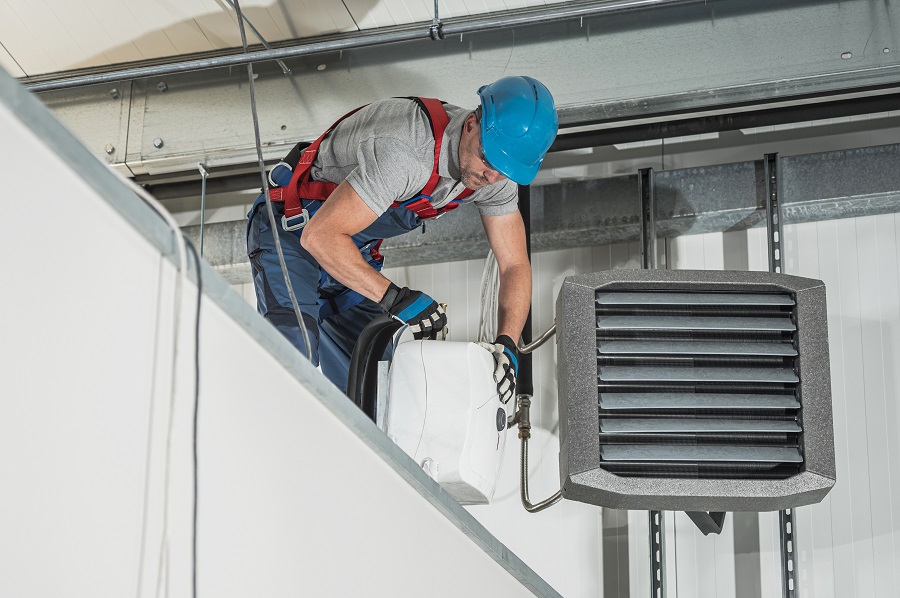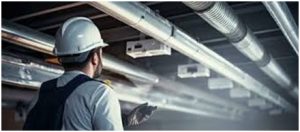
HVAC technicians are among the most sought-after technical workers in the labor market today. Home and business owners need their services for maintaining their heating, cooling, and ventilation equipment and systems.
New residential and commercial construction requires technicians to install HVAC systems. Existing homes and buildings need old equipment replaced with the latest efficient equipment. The possibilities for employment are plentiful in every state. HVAC is a multi-billion dollar industry in the U.S.
Jumpstart your career path with an associate degree from a technical college program. Follow that up with an entry-level job, a few years of experience, and earning industry certifications. HVAC work provides security in a stable and growing field of endeavor. It can take you from an entry-level service position to managing your own business.
HVAC Careers: Service Technician
The first job most HVAC workers get is a residential service technician. This position is easier to master than starting with commercial or industrial heating and cooling projects. Virtually every home in the U.S. needs HVAC equipment and services.
Technicians have many and varied responsibilities that require skills in these areas:
- Diagnosing electrical, mechanical, and equipment issues
- Identifying maintenance risks on equipment and systems
- Cleaning, adjusting, repairing, and replacing equipment
- Ordering and installing parts
- Performing warranty services
- Communicating with customers and supervisors
Each project brings different challenges, and the actual work can depend on the company’s specialization.
HVAC Careers: Equipment And Systems Installer
 The next step for technicians is installing equipment and systems for new construction and as replacements for old systems. The best systems must be selected for each situation and they must be installed correctly to function at peak performance.
The next step for technicians is installing equipment and systems for new construction and as replacements for old systems. The best systems must be selected for each situation and they must be installed correctly to function at peak performance.
New home and business construction requires skills in installing efficient heating, cooling, and ventilation systems. Replacing old systems requires dismantling the old system, removing it from the home or building, cleaning the area, installing the new equipment, and disposing of the old system.
| “HVAC technicians are among the most sought-after technical workers in the labor market today.” |
Work As A Ventilation Technician
Another career path is working as an HVAC ventilation technician. They work with both small residential projects and larger commercial projects. Their work consists of these services:
- For new construction, the ductwork and ventilation system must be mapped out for placement and amount of materials.
- Ductwork must be hung correctly with no air leaks and insulated where needed.
- It must be attached correctly to the heating and cooling equipment to function.
- Technicians clean out ductwork when maintenance requires it.
- They install fan systems where needed.
- Ensure indoor air is clean and humidity-controlled.
Specialize In Refrigeration Services
Another HVAC option you may enjoy is providing refrigeration services for commercial and industrial enterprises. Those who work in this position are called refrigeration technicians or refrigeration mechanics. Here is what they do:
- Install refrigeration systems
- Repair and maintain systems
- Work on HVAC units, ice machines, refrigerators
- Work with cold storage units, beverage equipment
These technicians keep materials, food, beverages, and medical supplies cool or cold to maintain their freshness. They typically work for refrigeration and air conditioning companies, hospitals, supermarkets, and restaurants.
How About Moving Up To A Systems Engineer?
 A refrigeration systems engineer specializes in designing and installing refrigeration equipment and systems for customers’ needs. The work includes these activities:
A refrigeration systems engineer specializes in designing and installing refrigeration equipment and systems for customers’ needs. The work includes these activities:
- Determine what cooling system is needed for each job
- Design and supervise each phase of its construction
- Manage the installation of the system
- Test the new system’s performance
- Make adjustments where needed
- Learn new technologies for application
A systems engineer takes additional professional training and needs years of experience to qualify for the position. This job pays well and has a stable future in many industries.
HVAC Careers: Start Your Own Business
Our last option is for those who want to be their own boss by starting an HVAC business. Requirements for this endeavor vary from state to state but generally require the owner to be licensed, insured, and bonded.
The most successful business owners hold all the major Industry certifications. Possessing them helps attract qualified employees and impress customers. Owners need to develop a three-year comprehensive business plan as a guide to success. The U.S. Small Business Administration (SBA) provides free consulting and planning services.
Three of the most significant things to do are researching the market, obtaining financing, and promoting the business adequately. Combine these steps with a strong business plan and work your way to success. Contact us today for more information.
For more information about graduation rates, the median debt of students who completed the program, and other important information, please visit our website at: https://iticollege.edu/disclosures/

